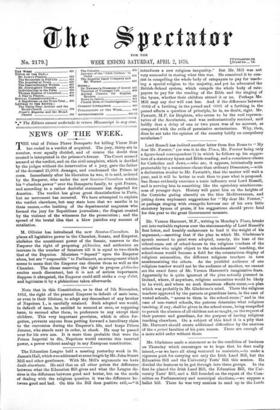The Education League held a meeting yesterday week in St.
James's Hall, which was addressed at some length by Mr. John Stuart Mill and other gentlemen. With Mr. Mill's arguments we have dealt elsewhere. He said that on all other points the difference between what the Education Bill gives and what the League de- sires is the difference between good and better, but on the mode of dealing with the religious question it was the difference be- tween good and bad. On this the Bill does positive evil,—" it
435 introduces a new religious inequality." But Mr. Mill was not very successful in stating what this was. He conceived it to con- sist in compelling the whole body of ratepayers to pay for teach- ing a special religion to the majority, and yet he advocated the British-School system, which compels the whole body of rate- payers to pay for the reading of the Bible and the singing of the hymn, whether their children attend it or no. Perhaps Mr. Mill may say that will cost less. And if the difference between 0002 of a farthing in the pound and -0001 of a farthing in the pound affects a question of principle, he is, no doubt, right. Mr. Fawcett, M.P. for Brighton, who seems to be the real represen- tative of the Secularists, and was enthusiastically received, said boldly that a delay of one or two years was of no account, as compared with the evils of permissive sectarianism. Why, then, does he not take the opinion of the country boldly on compulsory secularism ?


































